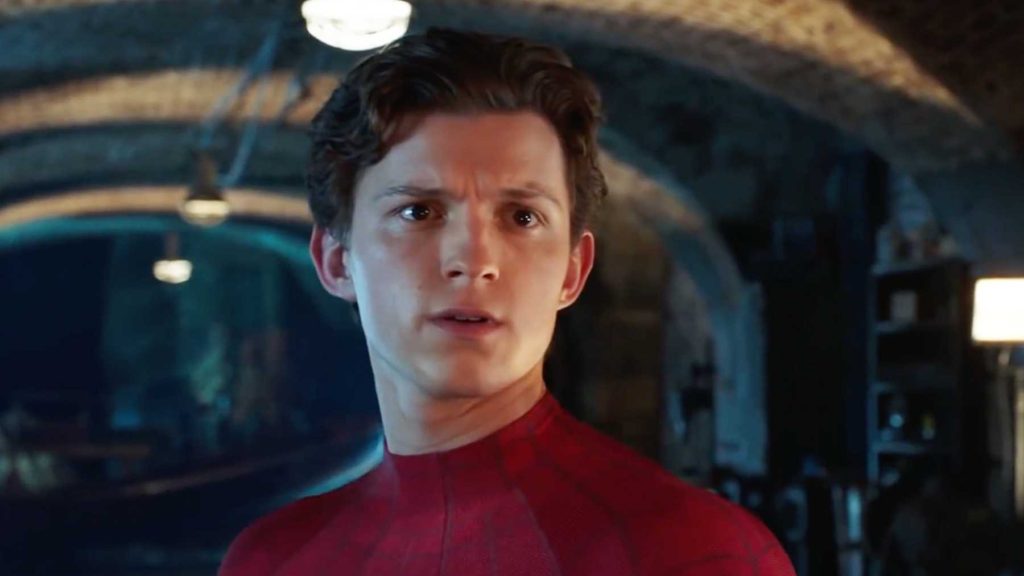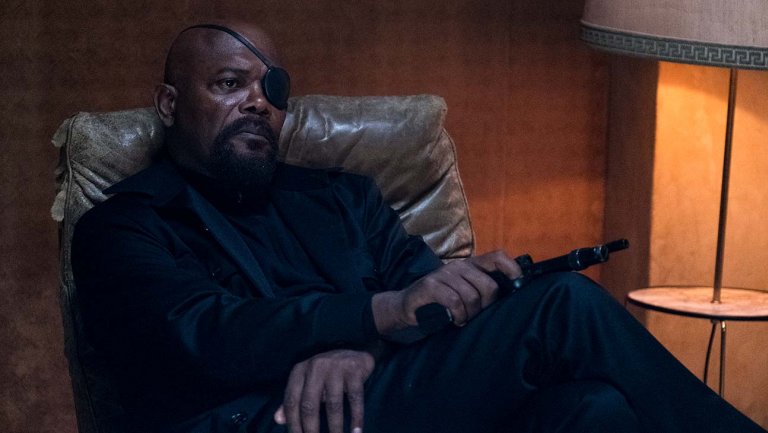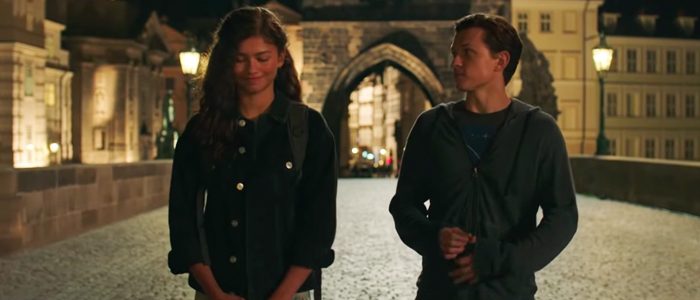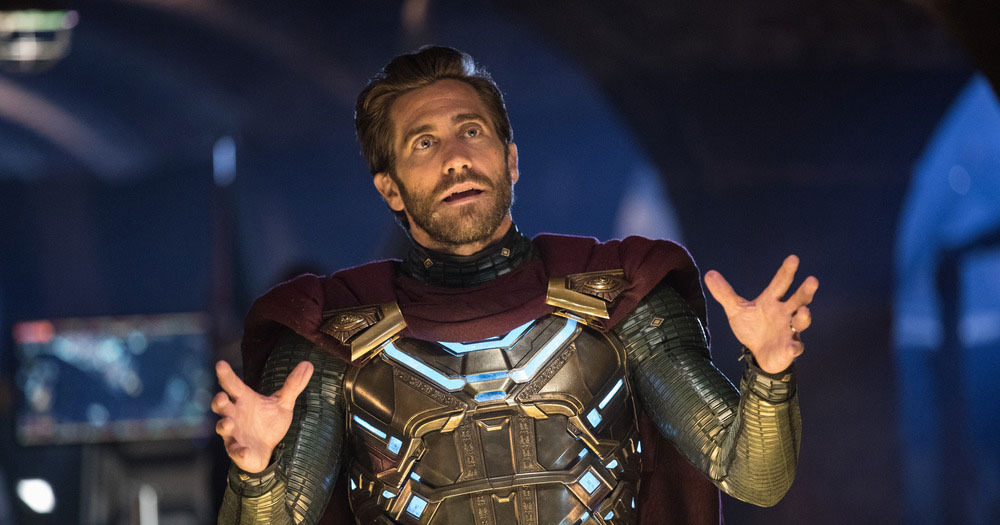
The Marvel Cinematic Universe has metastasized into an American institution, as sacred as apple pie or the Super Bowl or Beyoncé. Its supremacy is absolute. Still, following the seismic finale of Avengers: Endgame, it was fair to wonder if cinema’s most colossal franchise might have some difficulty regrouping, might fumble to develop a newfound sense of purpose. It takes all of 30 seconds for Spider-Man: Far from Home to obliterate that fear. Following a lightning-quick prologue set in Mexico, this jaunty new adventure opens with a cut-rate “In Memoriam” slideshow paying tribute to our fallen heroes. The crappy presentation of the images—the plastic look, the tacky music, the Getty Images watermark—proves to be intentional, as it’s quickly revealed that we’re watching a student newscast at Midtown High. And with that, in the span of just a few screenshots and some curmudgeonly narration from the immortally sour-faced Betty Brant (Angourie Rice), Far from Home dismisses any supposed continuity concerns—those who vanished in “The Blip” at the end of Avengers: Infinity War have barely aged since their return, those who remained are now five years older, please keep up—and also establishes its light, breezy tone.
This is no small feat, even if it’s one that the director, Jon Watts, also managed with Spider-Man: Homecoming, the prior Spidey installment whose first main scene brilliantly reimagined the famous airport fight from Captain America: Civil War as glimpsed through the chintzy, vertical iPhone camera of an anxious teenager. Liberated from the laborious world-building that encumbers so many comic-book crossovers, Watts and his writers (Chris McKenna and Erik Sommers) prove agile with both atmosphere and exposition. Sure, there are a few scenes where warriors congregate in dimly lit clandestine bases and worriedly chat about the latest catastrophic threat to the human race, but even allowing for these bits of superhero scheming, Far from Home’s primary concern is its characters.
Peter Parker’s primary concern, meanwhile, is to stop being so concerned. Following yet another bout of frantic world-saving in Endgame, the gawky teenager who secretly doubles as your friendly neighborhood Spider-Man (once again winningly played by the 23-year-old Tom Holland) opens this movie determined to hang up his spandex and just enjoy his upcoming field trip to Europe with the rest of his science class. And as their diametrically opposed titles suggest, Far from Home functions as a kind of thematic inversion from Homecoming; whereas in that movie, Peter chafed at his kiddie normalcy and craved the responsibilities of a fully grown Avenger, here he’s so invested on spending quality time with his schoolmates (not to mention the girl of his dreams) that he sends Samuel L. Jackson’s Nick Fury to voicemail.

This existential dilemma—the perpetual battle between public heroism and private happiness—is not novel, neither in superhero literature at large nor in the Spider-Verse in particular. It instantly recalls Sam Raimi’s original Spider-Man trilogy, which found Tobey Maguire’s Peter struggling to balance the taxing duties of his web-slinging with his aching desire for intimacy with Kirsten Dunst’s Mary Jane Watson. In Spider-Man 2, Raimi infused this internal conflict with extraordinary poignancy and dynamism, resulting in a landmark film that still sits at the apex of the genre. Far from Home does not threaten its perch. Its action is problematic (albeit intriguing), its plot is a little contrived, and its romance is more touching than overpowering. But it still has its own considerable charms: a smart and funny script, excellent actors, a modest scope that never feels ungainly or overstretched.
But about that romance. In Homecoming, Peter spent a good deal of time pursuing a girl named Liz, only for the pair to ultimately realize that they weren’t a great match; meanwhile, his quirky classmate, Michelle (Zendaya), casually announced in the final scenes that she goes by MJ, initials that blared like a beacon to even the most cursory Spider-Man fan. Sure enough, Far from Home immediately makes plain that MJ is Peter’s true crush, as he tells his best friend Ned (Jacob Batalon) that he intends to confess his feelings to her in Paris. It’s a rare clumsy move from the screenplay, clunkily informing us about an affection that presumably bloomed in the gap between movies, but that doesn’t feel entirely earned. It’s unfair to constantly compare this iteration of Spider-Man to Raimi’s films, but we knew Maguire’s Peter loved MJ because of the many delicate scenes the two shared together; we know this Peter loves MJ because the movie tells us he does.
Nevertheless, the actors make it work. Holland remains an intensely sympathetic presence, supplying Peter with an earnestness that’s half-dopey, half-charming. And Zendaya brings to MJ the same disaffected intelligence that she’s currently wielding on HBO’s Euphoria, creating a young woman with her own fears and desires rather than a token love interest. Their courtship—which is briefly and somewhat irritatingly interrupted by a hunky rival named Brad (Remy Hii), the rare MCU side character who takes more off the table than he puts on it—is a playful dance whose steps consist of shy glances and awkward stumbles rather than big speeches or sweeping gestures, resulting in its own gentle texture. It may not be Shakespearean, but it’s still sweet.

Of course, Peter has other things to worry about. A race of giant beings known only as The Elementals—so named for their atomic composition, be it earth, wind, fire, or water—is wreaking havoc across the globe. Fury and his stalwart sidekick, Maria Hill (Cobie Smulders), have teamed up with Quentin Beck (a fantastic Jake Gyllenhaal), a flying superman of sorts with golden armor, a burgundy cape, and a spherical helmet that occasionally encases his face within a cloud of pale-blue smoke. Beck, who is also called Mysterio and who can manipulate light and matter into glowing green force fields much like those that Benedict Cumberbatch harnessed in Doctor Strange, has a talent for battling The Elementals, but Fury insists that Peter join in the fight, especially once a watery monster climbs out of Venice’s grand canal and nearly turns the city into a ruin.
That sequence is noisy, shoddy, and a complete mess. In Homecoming, Watts pulled off not one but two genuinely impressive set pieces, whose energy and coherence marked them as comfortably superior to the weightless sound-and-light shows that typify the MCU’s action scenes. He’s regressed here. The Elementals are lousy antagonists, all theoretical bluster, no tangible danger. And Watts’s choreography is too herky-jerky, failing to convey a lucid understanding of Spider-Man’s constant slinging and leaping. Except…
It’s challenging to write about Far from Home’s approach to action, partly because it’s baked into the movie’s biggest reveal, partly because I’m not sure I entirely understand it. Suffice it to say that at its rough halfway point, the film quickly acquires a meta subtext. It’s canon that contemporary blockbusters lean too heavily on CGI, having replaced flesh-and-blood combat with digitized smoke and mirrors. Far from Home dares to make the metaphor literal. It’s a modern action movie about the turgidity of modern action movies.
Or maybe it isn’t. It’s impossible to tell if Watts has fashioned a sly commentary on Hollywood’s mundane action techniques, or if he’s fallen prey to that very mundanity. Perhaps it’s both. Either way, in its second half, Far from Home delivers a number of trippy set pieces that are undeniably interesting, even if they aren’t especially good.

You know what is especially good? Mysterio, or rather, the actor playing him. With perfectly windswept hair and a Prince of Persia beard, Gyllenhaal flashes an effortless, sexy charisma that suggests a matinee idol as well as a role model for the eager young Peter. But there’s more to the performance than jocular swagger; Gyllenhaal is a scarily clever actor, and he camouflages the character expertly, only to gradually reveal new facets of his three-dimensional persona. He isn’t exactly trustworthy—if you believe everything Mysterio says, I have a bridge in London to sell you—but you never doubt that you’re in good hands.
And despite its flaws—and notwithstanding a legitimately disturbing image in which a desiccated Iron Man begins crawling out from his own grave—Spider-Man: Far from Home is just good company. There are lots of funny lines stemming from Peter’s eternal cluelessness: his exasperation with the terminology surrounding his spidey sense (repeatedly dubbed his “peter-tingle”); his disbelief regarding the adorable courtship between his beloved Aunt May (Marisa Tomei) and his exasperated but loyal colleague, Happy Hogan (Jon Favreau); his bungling interactions with a deadly artificial intelligence named Edith (voiced by Dawn Michelle King in flat tones, unlike the warmly encouraging persona that Jennifer Connelly adopted in Homecoming). There are some cool locations and costumes; Spider-Man looks fighting trim in black, and a scene where he customizes a new suit coyly reinforces the film’s videogame bona fides. And there’s a killer mid-credits stinger, which promises major upheaval for the franchise going forward, and which features the triumphant return of a true fan favorite. I won’t spoil anything except to say that, as I left the theater with a smile, I found myself murmuring, “Bring me movies of Spider-Man.”
Grade: B
Jeremy Beck is the editor-in-chief of MovieManifesto. He watches more movies and television than he probably should.

Back in 2007, when the “last” X-Men and the “final” Spider-Man had ended, I remember saying to a friend of mine: “Welp, I think that’s the last of the super-hero movies.”
And then, after several years of eating crow, Endgame came out. I thought again: “Welp, maybe that’s the last.”
But the ball just keeps on rolling. And now I’m starting to wonder, coming from a person who never really cared for super-hero movies, will this train every stop chugging? And what will it take? Because personally, I’d like to see something different for once.
If I remember right, Judd Apatow says that it takes only two consecutive box-office bombs to undo a director’s career. Is that what it’ll take for the Marvel monster? Or will people’s attention need to be turned to something shinier? And has there ever been precedent for this before in movie history?
Two days ago, Marvel announced its “Phase 4” lineup, with a Black Widow movie, new Thor and Dr. Strange movies, and a bunch of new TV series, plus Mahershala Ali in Blade. So, the train isn’t stopping any time soon, though I suspect it will lose steam eventually.
I’m less concerned about Marvel’s dominance than I am about Disney’s. The MCU is a behemoth, but it only puts out a handful of movies a year, and most of them are pretty decent. Disney, on the other hand, might end up with 9 of the year’s top 10 films at the box office (assuming you count this Spider-Man, which is technically Sony, but whatever). And their strategy right now is to keep churning out sequels and remakes rather than original material. It’s commercially savvy but creatively troubling. (For further reading, check out this Guy Lodge piece: https://www.theguardian.com/commentisfree/2019/jul/11/cinema-disney-broken-up)
That said, if you’d really like to see something different, you honestly don’t have to look that hard. There are plenty of non-franchise movies out there, whether on Netflix or at the art-house. And if you weren’t able to catch them in theaters, many of them are available on a streaming service. Everything in my top 40 here is really good! https://moviemanifesto.com/2019/02/ranking-every-movie-of-2018-all-135-of-them.html